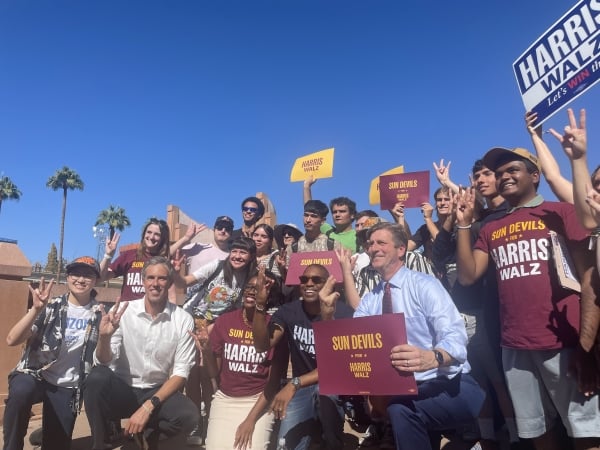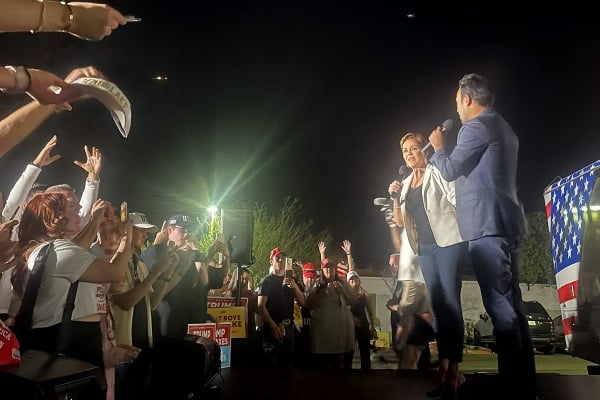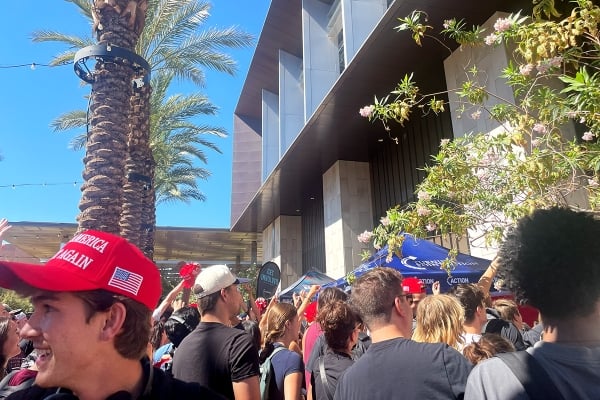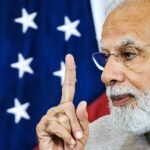The scramble for college voters in Arizona
TEMPE, Ariz.—Late October during a presidential election year usually means one thing for college campuses in a swing state: Don’t expect to walk far without running into someone asking if you’re planning to vote.
That’s certainly the case in Arizona. With days left until the polls close in an election experts are labeling a toss-up, Democrats, Republicans and other voting groups are scrambling to turn out crucial college student votes in the state, where President Joe Biden beat former president Donald Trump by a mere 10,457 votes in 2020.
“This is the battleground state in America that may very well—and most likely will—decide the outcome of the most important election, not in American history, but I would argue human history,” Beto O’Rourke, a former Democratic congressman from Texas, told a group of about 30 college students at Arizona State University in Tempe last week.
He urged them not only to vote for Vice President Kamala Harris, but to volunteer and encourage their friends and family to vote, too, before heading to the University of Arizona in Tucson to deliver a similar message.
“I’m here because you are going to save this country,“ he said. “We cannot afford to fuck this one up.”
That sense of urgency is coming from Republican and Democratic campaigns, as well as nonpartisan civic engagement groups, trying to turn out college student voters.
They’ve been on Arizona’s many campuses nearly every day for weeks, offering to help students make sense of Arizona’s four-page ballot—which includes a contentious U.S. Senate race, as well as propositions related to abortion and immigration—and make a plan to vote.
In Tempe—the left-leaning college town surrounded by a constellation of more conservative communities in the Phoenix megalopolis—it’s happening in parking lots behind college bars, inside sports arenas and on the sidewalk in between the library and student union at ASU.

ASU students pose with, from left in the front row, Beto O’Rourke, the former Democratic congressman from Texas who ran for president in 2020; Representative Lauren Underwood, a Democratic congresswoman from Illinois; Tony West, Kamala Harris’s brother-in-law and former U.S. associate attorney general; and Greg Stanton, former mayor of Phoenix who is campaigning to keep his seat in Arizona’s Ninth Congressional District.
Kathryn Palmer for Inside Higher Ed
Rallies. Speeches. Debates. Tents. Voter information tables. Door-knocking in off-campus neighborhoods. Door-knocking in residence halls (a.k.a. “dorm-storming”). Phone banking. Hats—lots of hats. Buttons. Raising Cane’s chicken fingers. Stickers (are you a Demo(b)rat?). Posters (Frats for Trump, anyone?). T-shirts. Burritos. Celsius energy drinks. Crumbl Cookies. Boba tea. Pop music. Country music. Rap. Celebrities. Social media influencers. Instagrammable, TikTok-able moments guaranteed.
Abortion, Disaffection on the Ballot
But all of that Gen Z-catnip is where the campaigns’ similarities in their strategies to reach young voters diverge, with Harris and the Democrats focused on wooing mainstream college-age voters, the wide majority of whom are planning to vote for her.
While Harris’s campaign is taking the more traditional approach of mostly working with the Democratic Party to mobilize student voters, Trump’s Arizona campaign has outsourced much of its work to political action groups, such as Turning Point Action and Elon Musk’s America PAC.
(In a move now facing legal scrutiny, Musk’s PAC has deployed workers in swing states—including some who have come to ASU’s campus—who are promising the possibility of winning a $1 million prize to people who sign Musk’s petition in support of First and Second Amendment freedoms, according to CNN. However, to be eligible to sign the petition, signatories must live in certain states, such as Arizona.)
Last week, the Democratic National Committee announced that it’s spending half a million dollars to put ads on buses, kiosks and other places on 30 campuses across 11 states, including Arizona, directing students to IWillVote.com, which tells students what they need to vote in a particular state.
While just 19 percent of college students nationwide said they’re voting for Trump and his running mate, Ohio senator JD Vance, 57 percent of college students said they’re planning to vote for Harris and her running mate, Minnesota governor Tim Walz, according to a survey Inside Higher Ed conducted in September. That same poll showed that college students’ support for Harris is even stronger in swing states like this one, where 63 percent of students said they plan to vote for Harris and Walz.
“This guy. That person. That person. They’re going to make the difference,” said Connor Gentry, a sophomore political science major at ASU and co-leader of Sun Devils for Harris, as he pointed out students walking around campus last Wednesday afternoon, right after the event with O’Rourke wrapped up.
He believes the people walking through those little strips of canvassing territory are some of the most consequential potential voters in the country.
That’s why Gentry has spent most of his free time this semester volunteering to register voters, recruit more volunteers and organize events, with the hope that it will get Harris and other Democrats elected—and pass Proposition 139, which would make abortion a constitutional right in Arizona and which advocates hope will boost student turnout in the state and help Harris.
For the most part, the people he’s met are receptive. “For every 100 good people, there’s one rude person,” Gentry said. “The energy on this campus is what’s going to save our country and get Kamala Harris elected.”
Nationally—and in swing states—the majority of college students say they’re most worried about their economic security after graduation, according to a survey Inside Higher Ed conducted in September. Reproductive rights came in a close second, trailed by immigration, the environment and gun violence as the most decisive issues.
Channeling concern for those issues is how Jason Marson, director of the Keep Arizona Blue Student Coalition and a political science student at ASU, typically starts conversations with potential student voters.
“Then we say, you care about these issues, here are the candidates that do, too. Almost all of the time, those are the Democratic candidates,” he said. “College campuses are the easiest way to completely run up our numbers with young voters and ensure they’re voting for Kamala Harris, Ruben Gallego [Republican Kari Lake’s Senate opponent] and Democrats all the way down the ballot, including judges, school board members, state legislators and propositions.”
In a state like Arizona, where 49 percent of registered voters ages 20 to 30 are registered Independents, that issue-oriented approach is “probably a smart move,” said Thom Reilly, a professor and co-director of ASU’s Center for an Independent and Sustainable Democracy.
Still, “at this point, most people have made their mind up,” Reilly said. “It’s about how you get them to the polls.”
Meanwhile, Trump’s supporters are focused on turning out conservative students who feel isolated in what they perceive to be liberal college campus environments.
“They are coming after your First Amendment rights,” Lake, a Trump surrogate running for U.S. Senate, told about 100 college students last Friday night at a campaign rally hosted by the ASU College Republicans at the Devil’s Advocate, a popular student watering hole in Tempe. “How many of you feel like you can speak freely on campus without being called a racist or whatever they’re going to call you?”

Kari Lake, the Republican candidate running for U.S. Senate in Arizona, urged about 100 college students to vote for her at the Devil’s Advocate, a popular student watering hole in Tempe. She was joined by former presidential candidate Vivek Ramaswamy and local Republican candidates.
Kathryn Palmer for Inside Higher Ed
The crowd—wielding signs that said “Frat Boys for Lake,” and “Trump Low Taxes, Kamala High Taxes”—booed, affirming the feelings of isolation that have been a hallmark of Trump’s base since today’s college students were in elementary school.
Lake was joined by Vivek Ramaswamy—a former Republican presidential candidate who’s also joined Kirk’s tour—and a host of other local Republican candidates who trickled out of an RV with a side panel featuring an image of Lake and Trump’s heads overlaid on the Grand Canyon to stump for Trump and themselves.
State Representative Justin Heap, who is running for Maricopa County recorder, pledged to fix what he characterized as a “broken” election process in one of the United States’ most populated counties, which became an epicenter of Trump’s failed attempt to overturn the results of the 2020 presidential election.
“I want to lift you up right now, but I’m really nervous about your future,” said Lake, who made unsubstantiated claims of election fraud after losing her bid for Arizona governor in 2022. “If we don’t stand up in the next 11 days like your lives depend on it, we’re done.”
The day prior, Trump himself held a rally at ASU’s Mullett Arena.
“We gotta make it too big to rig,” he told the crowd, which included college-age supporters wearing “Frats for Trump” T-shirts. They listened to the former president call Vice President Harris “stupid,” criticize her handling of immigration and warn that if elected, she “will pick your pockets,” before he jetted off to another rally in Las Vegas.
Anxiety about her economic future and her safety—Trump frequently casts undocumented immigrants as violent criminals—is why Avery Toft, a freshman from the Rochester, Minn., area, is planning to vote for Trump.
“I don’t have anything against immigration, I just think it should be legal,” said Toft, who attended the Lake rally. “I want to keep our cities safe for young girls, because obviously it’s already a bit of a challenge for us.”
Toft decided to register in Arizona for convenience and also because she realized “that it’s going to be much more of ‘is it going to go red or blue’ instead of Minnesota, which is always blue.”
One of the groups that helped her figure out how to do that was Turning Point USA, the Phoenix-based student-oriented conservative nonprofit that she’s a member of. Founded by right-wing activist Charlie Kirk, Turning Point USA has been building its presence on college campuses since 2012, including at ASU. (Its related political arm, Turning Point Action, is actively campaigning for Trump. Neither Turning Point USA nor Turning Point Action responded to Inside Higher Ed’s repeated requests for comment for this story.)
Kirk, who has previously been labeled by ASU faculty as one of several “purveyors of hate” for degrading women, minorities and the LGBTQ+ community, has made multiple appearances at ASU during the cycle, including in mid-October as part of his nationwide “You’re Being Brainwashed Tour,” inviting college students and celebrity guests to debate him about Trump and other topics such as LGBTQ+ rights and religion.

About 100 students attended an event featuring conservative activist Charlie Kirk on ASU’s campus on Oct. 17.
Kathryn Palmer for Inside Higher Ed
Events like that are “a good way to get people to turn out,” said Carson Carpenter, a political science major and president of the ASU College Republicans. “People want to come out and support [Kirk] because they want to show that their support for this movement isn’t waning. It’s not just older people, it’s a lot of younger people that have these ideals.”
Although Democratic student organizations on campus have deployed more traditional get-out-the-vote strategies, such as door knocking and phone banking, Carpenter said the College Republicans are taking a different tack this year.
“A lot of our students are mobilized on campaigns on their own personal behalf, where they’ll work on a campaign in operational settings,” he said. “Then, we’ll host watch parties and other events where they’re able to converse with other students who are doing the same thing.”
But some of the conservative-leaning students who came out to see Kirk aren’t quite sold on Trump’s brand of conservatism.
“He’s lost his fire and lost his appeal,” said Thomas, a finance and German major at ASU who asked to be identified only by his first name and lamented Trump’s views on foreign policy and acceptance of donations from megadonors. “If Donald Trump loses Arizona by one vote, it was because of a failure to cater to his base—young men who are most at risk of being conscripted, the people who feel ignored and the people whose interests are counteracted by lobbyists and super PACs.”
But Thomas, an Orthodox Christian and registered Independent from Maryland who’s voting in Arizona, said Harris and the Democrats’ secular approach isn’t “representative of the culture” he wants for the country, either.
“The odds of me voting for her are pretty low,” he said, standing in a thicket of mostly young men wearing red Make America Great Again hats that Kirk threw out during the event. “But the odds of me voting for a write-in are pretty high, unless I hear from Donald Trump himself a condemnation of the pro-war rhetoric we’ve been hearing.”
Wooing disaffected young men has been one of Trump’s campaign strategies. The presidential candidate has appeared at UFC fights and on podcasts popular with men, including those hosted by Joe Rogan, Adin Ross and Logan Paul.
It is—and isn’t—working.
Trump leads Harris (37 percent to 26 percent) among men between 18 and 29 who aren’t sure if they’ll vote. Harris, however, is heavily favored by young men (55 percent to 38 percent) who are definitely planning to vote, according to a recent Harvard Youth Poll.
Among young women in the same age range, Harris held a 30-point lead.
Turnout, Turnout
Although college students are notorious for their comparatively low voter turnout and apathy toward party allegiance, more of them are voting than ever before, in Arizona and nationally.
A record-setting 66 percent of college students nationwide voted in the 2020 presidential election. Registration and voting participation have also been on the rise in Arizona, according to the National Study of Learning, Voting and Engagement. At ASU, for instance, 63.4 percent of registered student voters turned out in 2020—up from 55.9 percent in 2016, according to the report. During that same time frame, the percentage of ASU students who were registered to vote also increased—from 68.4 percent to 79.7 percent.
According to another study, 66 percent of a sample of 1,315 registered Arizona voters between the ages of 20 and 30 said they plan to vote in 2024.
And when they do, organizers know college students are more likely than other voters to wait until Election Day, which offers an advantage to campaigns trying to grab last-minute votes.
Campaigns “have more time to recruit them, push them and talk them into voting,” said Kurt Davis, a Phoenix-based political consultant, who worked on the late Arizona Republican senator John McCain’s 2008 presidential campaign and formerly served as executive director of the Arizona Republican Party.
And the wispy lead Biden held to win states like Arizona in 2020 shows just how critical squeezing every last vote out of the state’s more than 300,000 college students could be in deciding who becomes the next president of the United States.
“After the fact, any campaign that loses by that small of a margin sits there and says, ‘If I would have gone to ASU and Northern Arizona University and the University of Arizona three more times and put in some extra money would I have made up 10,000 votes’? That’s where you want to kick yourself,” Davis said. “Could Arizona be an epically close election like that again? Absolutely.”
And Arizona’s rapidly growing and diverse population—a result of immigration from other states and countries, which includes thousands of college students at ASU, NAU and UA, means the policy issues that matter to the young people living there are just as diverse.
“Initially, I wasn’t planning to vote,” said Celeste Whiterock, a 19-year-old secondary education major at Mesa Community College, about a 10-minute drive from ASU’s Tempe campus. “I felt too overwhelmed with the choices. And also, my family and friends are very divided. I didn’t want to openly say who I supported to reduce conflict.”

A volunteer with NextGen, a political action committee that’s endorsed Kamala Harris and other Democrats in Arizona, speaks with a student voter on the campus of Mesa Community College.
Kathryn Palmer for Inside Higher Ed
Hearing a speech Arizona’s Democratic secretary of state recently delivered on campus about the importance of voting—and how certain groups weren’t always able to vote—pushed her to reconsider and register as an Independent. But she’s still undecided on whom to vote for.
What she does know is that she will be voting yes on Proposition 139, the Democratic Party–endorsed statewide ballot initiative that would make abortion access a constitutional right in Arizona. “I’m going to look at that stance for each candidate on the ballot.”
While Whiterock is from Arizona, many of her peers in the state are not.
And convincing out-of-state college students to register at their college-town address is one of the challenges that comes with securing student votes in Arizona, where an influx of out-of-state students has driven enrollment growth in recent years.
More Bang for Their Buck?
“We tell people that they could request an absentee ballot from California, but that they could also vote in a swing state and potentially get more bang for your buck,” said Nilay Jones, a student at NAU and a campus organizer for the Arizona Students’ Association, a nonpartisan group that registered more than 8,000 students before the deadline in early October.
“The likelihood of them voting in the election goes way down if they’re not getting a ballot where they live,” Jones said. “We also tell people, ‘Hey, you’re going to live here for four years. This is your home; what happens here affects you.’”
The consequence of voting in a swing state is resonating with out-of-state students like Allie Carr, a 20-year-old ASU student from Oklahoma who came out to the Beto O’Rourke rally last week.
She didn’t fully recognize the power of casting a swing-state vote until “after Kamala was running” and when she “realized abortion was going to be on the ballot in Arizona.”
While she’s firmly decided on casting a vote for Harris and Proposition 139, not all of the people in her orbit are as enthusiastic, which is something she’s trying to change.
“I do post a lot on social media,” Carr said. “I’m trying to reach out to people who I know follow me, but who I’m not as close friends with, but maybe they do need a push in the right direction and some new information presented to them.”
But just showing up at events, voting and posting on social media won’t seal the deal for Harris, Trump or any of the other candidates or propositions on the ballot, said Connor Gentry, the ASU student who’s been campaigning for Harris all semester.
“People love taking pictures with Bill Clinton, Beto O’Rourke and America Ferrera, but what they don’t like to do is put in the work of knocking on doors, working the phone and text banks, and going up to voters,” he said after the O’Rourke rally last week, which also included speeches from Democratic representative Lauren Underwood from Illinois; Tony West, Harris’s brother-in-law and a former U.S. associate attorney general; and Greg Stanton, former mayor of Phoenix who is campaigning to keep his seat in Arizona’s Ninth Congressional District.
“Pictures are cute, but what’s really important is that we have folks here that are doing the hard work—knocking on doors, making calls—and really making a difference,” he said. “This other stuff doesn’t really do shit.”
You may be interested

Wayne Osmond, Member of the Osmonds Singing Family, Dead at 73
new admin - Jan 02, 2025[ad_1] Wayne Osmond, an original member and second-oldest sibling in the Osmond family of singers, has died at the age…

Saints, Pelicans announce member of video production team among those killed in New Orleans terrorist attack
new admin - Jan 02, 2025[ad_1] As the New Orleans community continues to grieve those lost in the terrorist attack in the early hours of…

New Orleans New Year’s attack survivor recalls rampage from hospital bed
new admin - Jan 02, 2025[ad_1] IE 11 is not supported. For an optimal experience visit our site on another browser.UP NEXTRap legend Master P…




































